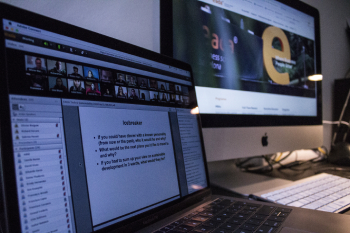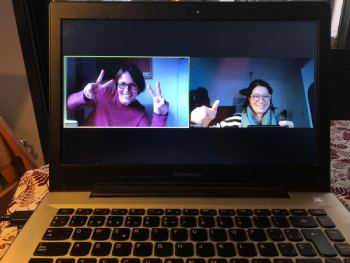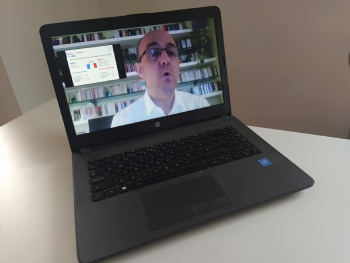EADA's Sustainability Week 2020
 During EADA's Sustainability Week, from the 30th of March to the 3rd of April, our International Master Programmes’ participants were able to test their knowledge and dig into key issues in sustainability and responsible management. This year, the event took place online as face-to-face classes were suspended due to the Covid-19 outbreak. Under the guidance of well-known experts from all over the world, EADA's participants had the opportunity to study a topic outside their usual curriculum and also to share the classroom with participants from the rest of the masters’ specialties.
During EADA's Sustainability Week, from the 30th of March to the 3rd of April, our International Master Programmes’ participants were able to test their knowledge and dig into key issues in sustainability and responsible management. This year, the event took place online as face-to-face classes were suspended due to the Covid-19 outbreak. Under the guidance of well-known experts from all over the world, EADA's participants had the opportunity to study a topic outside their usual curriculum and also to share the classroom with participants from the rest of the masters’ specialties.
Here are the issues reflected on during EADA's Sustainability Week:
-The Effect of Corporate Entrepreneurship on the Sustainability Businesses: With this course, participants explored the concept of innovation in association with entrepreneurship and corporate entrepreneurship. Felipe Augusto Jánica, Global Partner of EY, gave the seminar and according to him, “Innovative entrepreneurship is crucial for new ways of doing business. Putting yourself in the client's shoes and listening to market trends is the raw material for the entrepreneurs of the future. The digital component is a must, not an option.”
-Sustainability and Strategy in Latin America: Balancing multiple challenges: Through the analysis of different case studies, this course helped participants to combine their strategic thinking abilities with the challenges that firms addressing sustainability face in Latin America. Dr. Fabrizio Noboa, Strategy professor at the Universidad San Francisco de Quito (Ecuador), hosted the session and said, “Economic activity on the continent is heavily focused on the extraction and export of natural resources and raw material. This has increased the region's vulnerability to climate change. On the positive note, different environmental innovations have been implemented through novel business models designed by local entrepreneurs.”
 -Financing Climate Change: This seminar answered questions such as why the financial sector is key for climate change or how a financial firm can make shareholders and climate campaigners happy. EADA’s adjunct professor Christian Schmaltz hosting the session, said, “Although the financial sector is part of the problem of global warming, it can also be part of its solution. In a capitalist system, money is the key to allocate resources and, therefore, to decide which projects will be carried out and which not. Many projects require financing i.e. from banks, investment funds and insurance companies.”
-Financing Climate Change: This seminar answered questions such as why the financial sector is key for climate change or how a financial firm can make shareholders and climate campaigners happy. EADA’s adjunct professor Christian Schmaltz hosting the session, said, “Although the financial sector is part of the problem of global warming, it can also be part of its solution. In a capitalist system, money is the key to allocate resources and, therefore, to decide which projects will be carried out and which not. Many projects require financing i.e. from banks, investment funds and insurance companies.”
-Social Enterprise Business Model Design: This course was designed by Dr. Yuwei Shi, professor at Middlebury Institute of International Studies at Monterey and research director at Middlebury's Center for Social Impact Learning. Shi told them about social entrepreneurship, impact investing, sustainable innovation and business: “Like it or not, all companies in the future will need to be socially and environmentally conscious and responsible to ensure long-term viability. Society demands it. The technology enables it. And it's good for everyone.”
-Ethics and Effectiveness. The challenges of Good Leadership: One of the main points of this course was the concept of transformational leadership. According to EADA's professor Ferran Velasco, from the Strategy, Leadership & People Department, “this concept focuses on transcendent and far-reaching goals and ideas; it also inspires followers by raising consciousness of what is important with regards to values and moral and ethical issues”. Participants also reflected on the difference between leaders and managers. To Velasco, “Leaders set a direction, align with people, motivate, and inspire. Managers, on the other hand, convert the long-term objectives into short-term actionable plans, organise, staff and control activities by solving problems at the same time.”
-Integrating Sustainability into Business Strategy: This course was given by Dr. Paolo Taticchi, who is a professional teaching fellow in Management & Sustainability and Executive Director of Global Student Experience at Imperial College Business School. To him, “How to develop a sustainable competitive advantage is a key in today's agendas of global executives. Leaders should promote sustainability not only in all areas of the organisation but among the other players of the industry. They have the responsbitily to educate the industry and support smart initiatives in this field, despite not having profits in a short-term.”
 -Making a Social Impact at the Bottom of the Pyramid (BoP) through Marketing. This seminar focused on the significance and potential of markets at the bottom of income pyramid in the world. It was conducted by Dr. Harvinder Singh, professor in Marketing with IMT Ghaziabad (India) and IMT Business School Dubai (UAE). As Singh told us, “More than 5 billion people at the BoP are often ignored by companies, assuming them to be unprofitable. However, companies don't realise that they are collectively a profitable segment because the sheer size of this market is huge”.
-Making a Social Impact at the Bottom of the Pyramid (BoP) through Marketing. This seminar focused on the significance and potential of markets at the bottom of income pyramid in the world. It was conducted by Dr. Harvinder Singh, professor in Marketing with IMT Ghaziabad (India) and IMT Business School Dubai (UAE). As Singh told us, “More than 5 billion people at the BoP are often ignored by companies, assuming them to be unprofitable. However, companies don't realise that they are collectively a profitable segment because the sheer size of this market is huge”.
-Activist Shareholders and Corporate Sustainability Agendas. The controversial Dilemma for Food Staples. Course hosted by the entrepreneur Iván Cuesta, who is currently heading up Global Operations and the Pharmaceuticals division of DMK Baby. Cuesta gave 3 key points regarding what to do with activist shareholders: “Build a response together with company's teams and experts in legal, financial, communication and investment matters; understand activist's proposals and analyze pros and cons; develop a response plan and open a dialogue with them.”
-Doing Business as Unusual: In this course, given by Dr. Stefan Gröschl, Management professor at ESSEC Business School, participants explored individual and organizational responsibilities. To Gröschl, “Leading organisational change toward greater sustainable business practices starts at an individual level with self-reflection and a better self-understanding of one's personal values and beliefs. Sustainability in companies has become not only a challenge but an opportunity and a necessity.”
-Sustainable Fashion. Challenges, Strategies and Future Scenarios. Dr. Julia Wolny, EADA's associate professor and consultant in responsible customer experience design, explored the challenges facing the fashion sector to achieve sustainability. To Wolny, “the systemic shift in this industry needs to take into account both production and consumption practices”. She added, “There are three areas in which fashion industry can make a difference: environmental, social and ethical.”
 -Managing Humanitarian Emergencies: In this seminar, participants were introduced to the main components required to respond to humanitarian emergencies. It was given by Dr. Nines Lima, a doctor with 17 years’ experience working in humanitarian aid with Médecins Sans Frontières, and Núria Salse, a nurse with more than 15 years of experience in nutrition in developing countries. According to them, “In any emergency situation teams must have the expertise to be agile and the flexibility to make fast decisions. In the same way, companies need extremely operative and effective teams focused on achieving results.”
-Managing Humanitarian Emergencies: In this seminar, participants were introduced to the main components required to respond to humanitarian emergencies. It was given by Dr. Nines Lima, a doctor with 17 years’ experience working in humanitarian aid with Médecins Sans Frontières, and Núria Salse, a nurse with more than 15 years of experience in nutrition in developing countries. According to them, “In any emergency situation teams must have the expertise to be agile and the flexibility to make fast decisions. In the same way, companies need extremely operative and effective teams focused on achieving results.”
-Digital Innovation as a Driver for Sustainable Economies: This course covered current digital trends to provide an overview of the current mobile and AI-first technology landscape. It was given by Richard Ferraro, 4YFN Sales director and associate professor at Barcelona Technology School and UIC, and Olivier Buigues, CEO of Losadi and associate professor at Tolousse Business School. They highlighted “the role of mobile networks in providing critical infraestructure that spurs inclusive and sustainable development, apart from a greater innovation.”
-AI and IoT for Circular Economy and Impact: This seminar was designed by Dr. Saman Sarbazvatan, director of Programs at École des Ponts Business School and Senior Advisor of Technology & Business Modeling at Circular Economy Research Center. Participants worked on innovative solutions to leverage combinatorial evolution of technologies empowered by Ai and IoT, apart from working on ideation, conceptualization, design and application of their projects.
